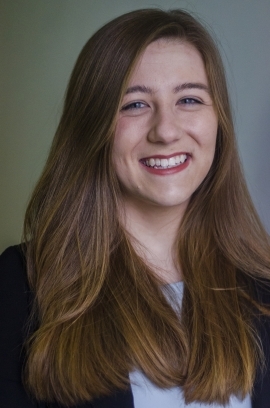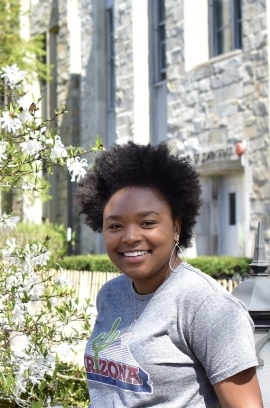St. John’s University and Jamaica Hospital Medical Center, Department of Family Medicine (JHMC) collaborate on a research training program – The Collaborative Health Integration Research Program (CHIRP). The program includes St. John’s undergraduate students in Psychology and Biological Sciences, as well as graduate students in Psychology and Resident Physicians in Family Medicine at Jamaica Hospital Medical Center.
CHIRP fellows gain practical training in the conceptualization and implementation of research in behavioral medicine, with a focus on health disparities. They explore how social environments influence psychophysiological and behavioral processes that have effects on health status and health behavior. CHIRP fellows learn how to design and implement basic and applied research studies, collect and analyze data, address ethical issues in conducting research, write presentations and manuscripts, and prepare proposals for funding.
Scientists and their students from other universities collaborate with CHIRP fellows on projects investigating and addressing health disparities. Research projects undertaken through CHIRP are designed to maximize the degree to which findings have direct implications for understanding clinical problems and improving health care. For the 2018-2019 academic year, the program includes more than 60 CHIRP Fellows.
“The CHIRP fellows are a wonderful, highly motivated group of students and physicians who come from a wide range of backgrounds,” said Psychology Professor and CHIRP Director Elizabeth Brondolo, Ph.D. “Collaborating with these young professionals has been both very productive and very inspirational. The knowledge and life experiences CHIRP Fellows bring to the research process continually improve the quality and relevance of our work.”
Abigail Crete ‘17C

Abigail Crete graduated with her B.A. in Psychology from St. John’s in 2017 and has just completed her first semester as a Ph.D. student in Clinical Psychology at Columbia University. From 2017-2018, she worked at Columbia University Medical Center conducting research on therapies for social anxiety.
As an undergraduate student in the CHIRP lab, Ms. Crete participated in two research projects. One examined physician’s emotional regulation in end-of-life care. Another focused on the use of technology for ecological momentary assessment, which involves the repeated sampling of subjects' behaviors and experiences in real time in their natural environments to capture the most accurate data. As part of this study, participants were given smartphones on which they recorded social interactions to determine how instances of discrimination affect cognitive processing, health behaviors, and health outcomes.
Originally from Cumming, GA, Ms. Crete chose St. John’s because she wanted to get involved in psychological research. On a prospective student visit, she met former Psychology Chair Raymond A. DiGiuseppe, Ph.D., and asked him what research opportunities were available to undergraduate students. “It’s a unique feature of St. John’s that undergraduate students can get involved in research,” she said. “After I met Dr. DiGiuseppe, who told me about the various projects undergraduates were working on, and saw the respect faculty have for their students, I knew I wanted to come to St. John’s.”
“The CHIRP lab helped me develop translatable skills and played a huge part in my development as a researcher,” she said. “It can be daunting for undergraduates to engage in research because it’s a very different, more open-ended structure than the classroom setting. But through CHIRP, where students at multiple levels all come together, I gained experience with conceptualizing a research study, creating a protocol, IRB approval, selecting participants, performing literature reviews, and collecting and analyzing data. Dr. Brondolo appreciates the skills everyone brings with them and is able to adapt to working with students at all different levels, which is what makes her lab so successful.”
Amandeep (Amanda) Kaur ‘16G

After graduating from St. John’s with her M.A. in Psychology in 2016 and continuing to work with Dr. Brondolo as lab coordinator from 2016-2018, Amandeep (Amanda) Kaur ‘16G is now a first-year Ph.D. student in Psychological Science at the University of California (UC), Irvine. In her current program, she continues to study how cognitions and emotions interact to influence health throughout the lifespan – specifically, how experiences of inequality and discrimination shape stress exposure and contribute to health disparities – research that she began in the CHIRP lab.
“Dr. Brondolo’s lab is a unique experience,” she said. “I’ve worked in other labs and haven’t witnessed the same dynamic anywhere else. The inclusive environment of CHIRP allows you to work with high school students, undergraduates, masters and doctoral students. It’s a degree of multi-level collaboration you don’t see very often. Dr. Brondolo is always pushing us to hone our individual skills within the larger context of our collective values and goals.”
Ms. Kaur, who also holds a bachelor’s degree in psychology and social behavior from UC Irvine, came to St. John’s for her master’s degree because she wanted to work with Dr. Brondolo and gain research experience under her mentorship. She has been interested in studying psychology since high school and now aims for a career in public policy that will allow her to apply her knowledge of psychology toward improving people’s neighborhoods and health conditions. The experience she has gained with Dr. Brondolo, especially publishing research in an American Psychological Association (APA) Stress and Health Disparities Report, and presenting that research in Washington, D.C. at the APA, has helped prepare her for this career path. “The APA report made me want to conduct more applied research, especially large-scale interventions that take into account the physical and social context and how that might influence the success of the intervention,” said Ms. Kaur. “These kinds of intervention require a lot of resources, especially money. My goal is to write grants for those kinds of interventions.”
Luke Keating ‘16C

Currently a clinical research coordinator for psychiatry and neurology trials at Fieve Clinical Research, Inc. (FCR), Luke Keating ‘16C is currently applying to doctoral programs in psychology and conducting volunteer research at Northwell Health.
Mr. Keating continues to collaborate with Dr. Brondolo on the development of a scale to measure physicians’ emotional self-regulation efficacy in palliative care. “Understanding to what extent physicians are able to regulate their own emotions and the emotions of their patients helps us to evaluate and improve patient-physician communication in stressful situations and direct the care a patient receives at the end of life,” he said.
He considers palliative care an area where researchers can see the most direct impact of their work on patients’ experience. “Something that was explicitly discussed in the CHIRP lab was the belief that what we do in research matters long past the shelf life of any individual study,” said Mr. Keating. “It informs the larger systems and structures for how to treat people. Dr. Brondolo helps you think through the ‘why’ and understand our priorities as scientists.”
After graduating with his B.A. in Psychology from St. John’s in 2016, Mr. Keating is preparing applications for doctoral programs in psychology. “I feel prepared to make the transition to a doctoral program because of my involvement in CHIRP,” he said. “That experience taught me to think like a scientist and work with a larger collaborative and interdisciplinary research network. CHIRP teaches you critical thinking skills and gives you an understanding of how the research process is conducted, as well as how to find a place in research that makes the best use of your skills.”
Mr. Keating, who grew up in Wantagh, NY, came to St. John’s as an undergraduate with the aim of preparing for a clinical psychology doctoral program. After taking Research Methods in Psychology with Dr. Brondolo, he approached her about research opportunities and she invited him to join CHIRP.
“The CHIRP lab is broad in focus, and if you have a particular interest, Dr. Brondolo is great about helping you to explore that interest,” he said. “My involvement with CHIRP was a formative experience for me and I recommend it to anyone. Dr. Brondolo treats you like a collaborator and to the extent that I was willing to get involved in research, she was willing to support me.”
Sameera Ramjan ‘18C

Sameera Ramjan ‘18C, a St. John’s Psychology alumna who is now a master’s student in psychology at Stony Brook University, found that her exposure to research as an undergraduate student gave her the competitive edge to get into her current graduate program, along with only 16 other students.
“There are so many opportunities for you to grow as a researcher at St. John’s if you take the initiative to find them,” said Ms. Ramjan. “CHIRP provided me with firsthand experience of what the research process looks like once applied to a working theory. I took part in formulating Institutional Review Board (IRB) protocols, grant proposals, and was given the opportunity to work with human subjects and run them through an entire study. As an undergraduate, you don’t think you’ll be in a research methods class and the very next semester, apply everything you learned in an actual lab. However, Dr. Brondolo provides you with this opportunity. Everything we’ve accomplished in CHIRP has given me a competitive edge, and I feel that I am better prepared for graduate school. I find that I am now expanding on these skills, instead of having to learn the foundations of research methodology in graduate school.”
Her involvement in CHIRP has helped Ms. Ramjan pursue her interest in integrative neuroscience. Thanks to experience she gained doing neuropsychological testing as an undergraduate, Ms. Ramjan landed a coveted neuropsychology internship at Stony Brook Medicine. “They were blown away by my experience working with patients and that I was able to do this as an undergraduate,” she said.
Ms. Ramjan, who is originally from Queens, NY, chose St. John’s because of its small class sizes and the ability to get to know professors. She is now applying for doctoral programs in clinical neuropsychology, and appreciates Dr. Brondolo’s networking assistance as she pursues her career. “Dr. Brondolo gives us the opportunity to connect with past CHIRP members, who share their personal experiences and valuable advice with us as we advance in the academic world of psychology. She hosts retreats in which we discuss research findings, and this allows us to connect with one another to form our own networks. She’s always looking for ways to help her CHIRP fellows continue to grow, even after they leave St. John’s.”
Ms. Ramjan is currently working in the neurology department at Stony Brook Medicine on a study that studies the effects of chemotherapy on executive functioning, and how cognitive training programs can improve everyday functioning. She will be assessing executive functioning through the use of neuropsychological testing.
“I’m thankful to have Dr. Brondolo as a mentor,” said Ms. Ramjan. “She provided me with the guidance I needed to pursue graduate studies, and gave me the chance to grow in her lab and take on leadership roles. Because of her training, I can say that by age 20, I have accomplished more than I thought feasible, and I hope to one day be a mentor that guides her students in the same way.”
Da’Mere Wilson ‘18C

Da’Mere Wilson ‘18C joined the CHIRP fellows in her junior year as a Psychology major and Sociology minor. She worked with Dr. Brondolo to explore how experiences of discrimination or poverty affect health outcomes. Ms. Wilson knew that she wanted to pursue a doctoral program in clinical psychology, but didn’t know where to begin on her career path, and the research experience in Dr. Brondolo’s lab gave her a helpful start.
“I didn’t know where to start pursuing a career in clinical psychology, but I knew that you had to have done undergraduate research to get into graduate programs,” said Ms. Wilson. “Working with Dr. Brondolo taught me how the research process works, which is very different from just reading a textbook. It was valuable hands-on experience.”
The experience in CHIRP also helped Ms. Wilson decided that a career doing psychological research would be a good fit for her. “In Dr. Brondolo’s lab, you see the research process at a personal level because you are working with human subjects. In such a competitive field, it’s important to like what you are doing, and my opportunities in CHIRP allowed me to get involved in research as an undergraduate and decide that I could really commit to it.”
Ms. Wilson began a Ph.D. program in Clinical Psychology at the University of Arizona in fall 2018. Throughout her application process, she found Dr. Brondolo’s mentorship gave her a competitive edge. “People recognized her name throughout my graduate interviews,” said Ms. Wilson. “It was invaluable to have her mentorship. Dr. Brondolo embodies everything I want to become professionally: she is a great therapist, great researcher, and great mentor.”
As an independent study project during her senior year at St. John’s, Ms. Wilson also participated in Dr. DiGiuseppe’s Anger Research Center working to answer the question: do students of color have higher levels of stress, depression, and anger? Even though Ms. Wilson has now graduated, she continues to pursue this research with Dr. DiGiuseppe.
At the University of Arizona, will continue her research into health disparities to explore social stressors and how they affect health. For her graduate research, she will focus on how experiences of discrimination, grief, and other stressors impact the development of cardiovascular disease within the African American and Latinx community. As a master’s student at…Ms. Wilson wrote a thesis on how discrimination within communities of color affects the development of cardiovascular disease, and this is research she will explore in more depth at the doctoral level.
Ms. Wilson, who is originally from Dallas, TX, chose St. John’s for her undergraduate degree because she wanted to be in New York City. “I knew it would be a big adventure and that I would learn a lot,” she said. She was a Ronald E. McNair Scholar, a Wellness Peer Educator, and active in Spectrum while a student at St. John’s, and served as a peer mentor during her senior year.
Related News
St. John’s Joins National Network to Empower Catholic Leaders
St. John’s College of Liberal Arts and Sciences at St. John’s University is joining a network of 16 Catholic colleges and universities in a grant-funded effort to strengthen listening, dialogue, and...
Honors Student Sets Her Sights on a Career in Government
Gurbani Sian traveled around the world only to find a home at St. John’s University. Born in Chandigarh , India, the first-year Government and Politics student at St. John’s College of Liberal Arts...
St. John’s University Joins National Network to Empower Catholic Leaders
FOR IMMEDIATE RELEASE Media Contact: James Stephen Smith Director of Media Relations, St. John’s University 516-313-4568 (c), 718-990-5789 (o) [email protected] St. John’s College of Liberal Arts...
